From Solitude to Solidarity: The Impact of Writing Communities on Young Writers

Despite writing often being a solitary act, the value of immersing oneself in a writers’ community cannot be overstated.
Writing groups offer more than just networking opportunities; they serve as foundational support networks, fostering connections that can advance your career and provide emotional and creative support.
Engaging with a writing community can significantly improve your writing, offering fresh perspectives, constructive criticism, and encouragement.
Here is how to build your literary community.
Key Takeaways
- Writing communities form a dynamic network of writers, readers, and publishers, providing a crucial support system and fostering a sense of belonging through collective growth, feedback, and encouragement.
- Various platforms allow writers to engage, share, and find inspiration, from critique circles and writers' programs to community events and residencies.
This article goes over:
What Are Writing Communities?
A writing community is a vibrant collective of individuals engaged in the craft and appreciation of literature—writers, readers, and publishers alike.
A writing community serves as a crucial support network, offering encouragement and solidarity through the highs and lows of a writing career.
Within these communities, writers’ groups and critique circles play an essential role, providing a platform for feedback, learning, and growth.Young writers, in particular, find value in these gatherings, gaining insights and encouragement from more experienced peers.
Writers’ communities are hubs for sharing opportunities – writing contests, literary agents seeking new authors, and publishing openings.Writing groups facilitate collaborative projects, expanding creative horizons and opening doors to co-authoring opportunities, anthology contributions, and more.
Post-pandemic, online writing communities have flourished, allowing writers from around the globe to connect, share their work, and receive feedback, regardless of geographical barriers.
Writers Groups [& Where to Find Them]
Engaging with a writers’ group fosters career growth, pushes you beyond your comfort zone, and offers solidarity in the solitary writing journey.
Here is where to find your writing community.
1. Critique circles
Critique circles offer a vital space for writers to receive feedback, stay accountable, and navigate long projects without losing direction in plot or character development.
These groups, forming a core part of the author community, range from casual gatherings to well-organized sessions. Participants might be members of writing workshops, have social media connections, or be passionate readers.
While support is essential in the writing journey, stepping outside comfort zones and engaging face-to-face or with online writing groups challenges writers to grow beyond the comfortable feedback loop.
Beyond critique groups, writers can explore various group formats.
Groups like #1000wordsofsummer, National Novel Writing Month, and Book Banter Groups offer diverse ways to connect, share, and motivate within the writing community without the cost.
2. Writers' Programs
Professional programs and writers’ programs are a significant step for those deeply invested in their craft.
Through graduate degrees in fields like journalism and participation in collaborative writing and teaching, authors build lasting networks that support and enrich their careers.
This professional setting fosters learning and cements one's identity as a serious writer and part of the skilled author community.
Online writing groups also offer educational opportunities.
Regular participation in a multi-week class, as opposed to one-off events, fosters deeper connections, aiding in the quest for writing prompts and collaborative learning.
Besides university writing programs, look at the Bread Loaf Writing Conference, Kundiman Retreat, Cave Canem, or Tin House Workshops.
3. Community events
Engagement in community events extends the writing groups’ experience beyond critique and professional development into the broader cultural sphere.
Attending readings, book launches, book clubs, and various artistic events enriches the writer's worldview and fosters connections.
This active participation inspires and offers practical insights into marketing and event organization, invaluable for one's own book promotions.
Local book festivals, literary fairs, and drop-in writing groups online like Shut Up & Write! and Meetup are excellent for writers seeking community and inspiration.
4. Writers’ residencies
Writers’ residencies, retreats, and fellowships offer opportunities for immersive creative experiences. Such settings allow for introspection and the development of one's professional values through interactions with a diverse group of creatives.
From realizing personal writing principles to embracing doubts, these experiences shape the author's approach to their work and the literary community at large.
Here are some residency programs for you to check: GlogauAIR [Berlin, Germany], La Baldi [Tuscany, Italy], Art Omi [New York, USA], Constance Saltonstall [Ithaca, NY], Camargo Foundation [Cassis, France], Westfjords Residency [Westfjords, Iceland]
5. Writers' conferences
Writers conferences offer direct access to authors, agents, and editors.
Active participation in conferences can lead to meaningful engagements, learning opportunities, and a stronger sense of belonging.
🔥 If you find the cost of attendance inaccessible, volunteering is an alternative. Volunteering at a conference might limit participation in panels but still unlocks opportunities to engage with individuals in ways not typically available to regular attendees.
The Association of Writers & Writing Programs [AWP] hosts the most extensive conference of its kind. For those seeking such events, AWP's website has a detailed directory of Conferences and Centers.
6. Professional associations
Professional groups help writers connect and grow. They give resources and support, making a writer's journey in the author community better.
Professional associations: Women’s Fiction Writers Association, Society of Children’s Book Writers and Illustrators, European Writers' Council.
7. Social media
Literary communities thrive on various social media platforms. Jane Friedman emphasizes the importance of playing to your strengths and choosing a platform where sustained activity is possible.
Building a presence on one platform, following authors, bookstores, and literary agents, and interacting with like-minded people enriches a writer's understanding of the literary and publishing landscape.
🔥 Join our very own PublishDrive Facebook Group and worry less about publishing. We’ve got you covered.
For those interested in wide publishing, join Wide for the Win.
8. Newsletter platforms
Newsletters offer a vibrant space for engaging with the literary community. By subscribing to and commenting on newsletters that capture interest, writers can connect with authors and fellow readers, fostering a sense of online writing communities where ideas and insights circulate freely.
The best subscription network for independent writers and creators to try is on Substack.
9. Beta reader match up
These services facilitate constructive exchanges and solidify authors’ places within supportive online writing communities.
For writers ready for feedback but in search of beta readers, services like Bianca Marais’ Beta Reader Match Up link writers with appropriate peers for a small fee.
16 Writing Communities [Paid & Free]
Here are some writing communities where you can improve your writing skills.
1. The Next Big Writer
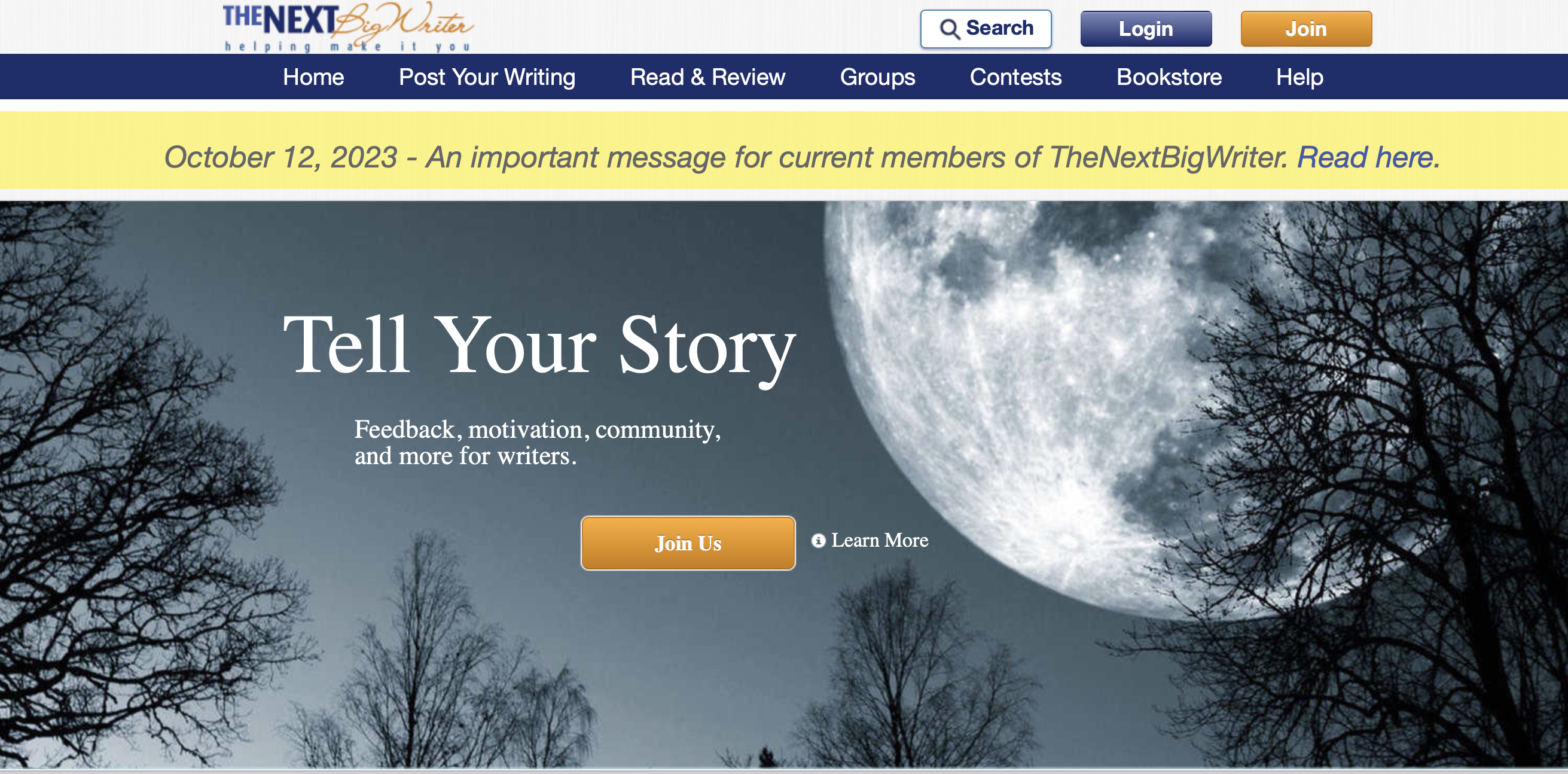
Established in 2005, The Next Big Writer brings together a vibrant community of thousands of writers and integrates advanced tools, contests, classes, and communication channels to support members in reaching their writing objectives.
- Monthly Plan: Priced at $8.95 per month.
- Quarterly Plan: Available for $21.95 per quarter, which breaks down to less than $7.50 per month.
- Yearly Plan: Offered at $69.95 per year, equating to less than $6.00 per month.
2. Absolute Write
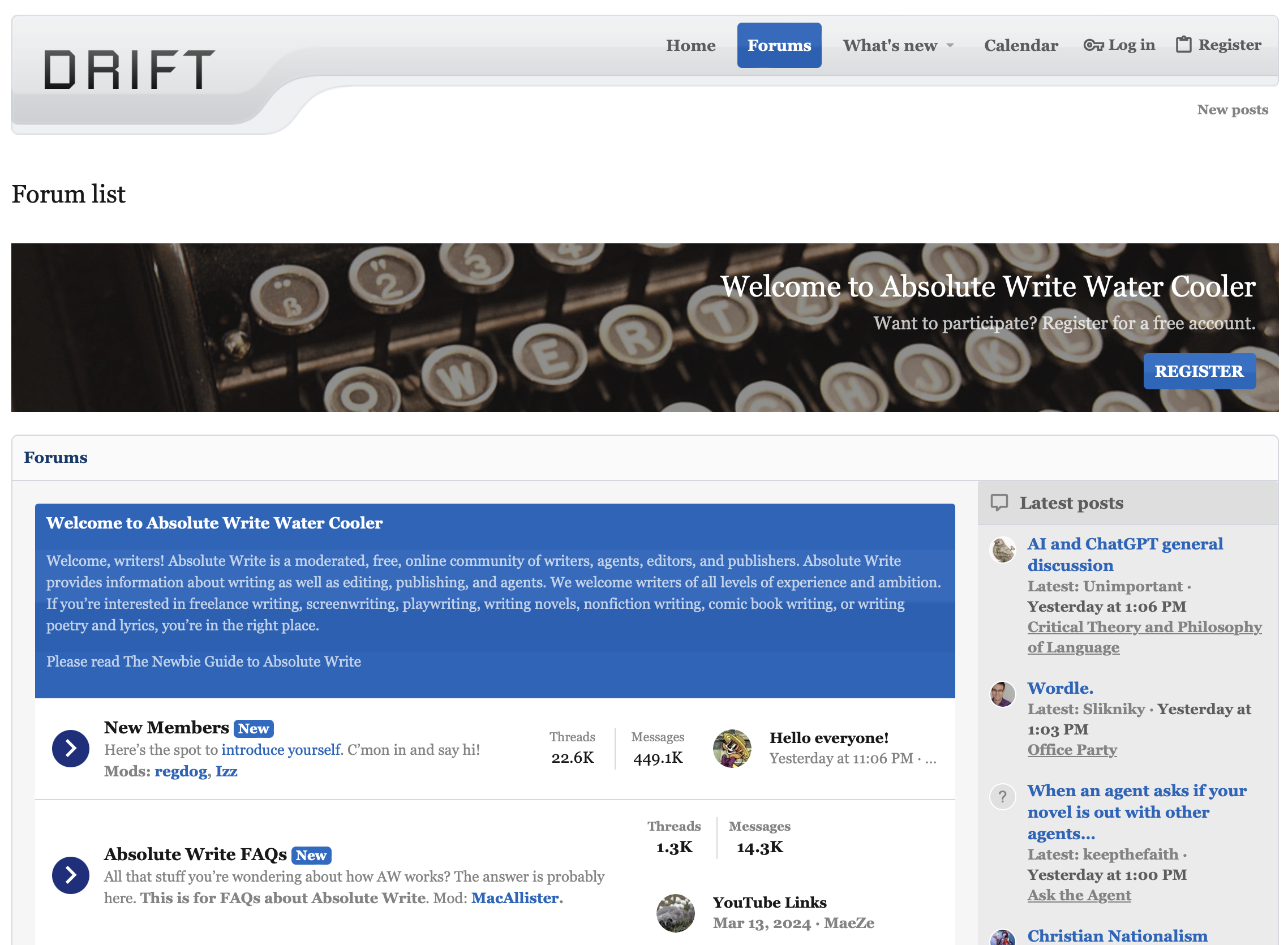
Absolute Write is a moderated, free online community encompassing writers, agents, editors, and publishers. The platform welcomes writers across all experience levels and ambitions.
3. Women Who Write
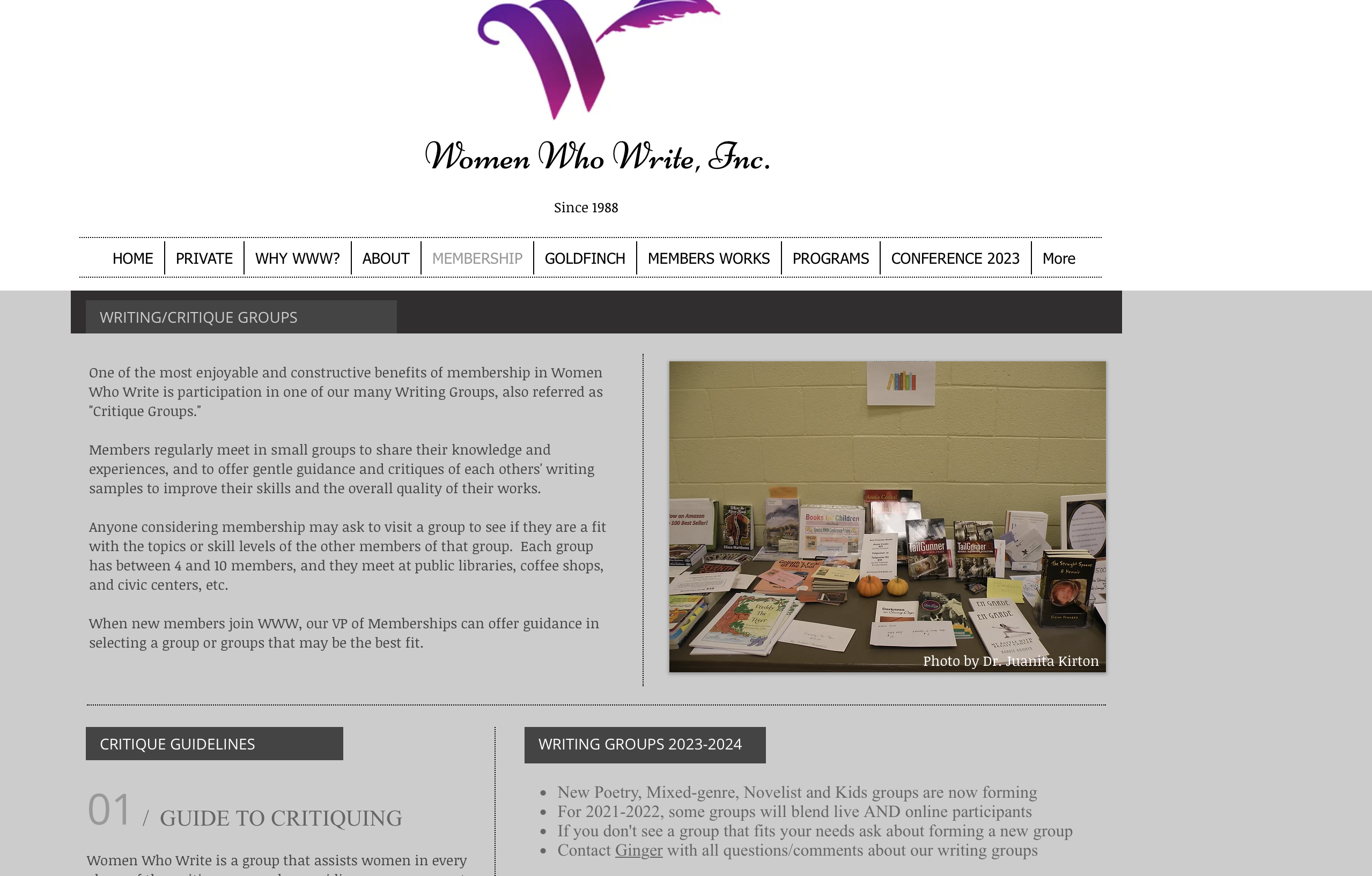
Women Who Write, Inc., was founded in June 1988 as a single writing group known as Mothers Who Write. Presently, it has evolved into a regional organization for women writers and a nonprofit corporation that hosts writing groups across New Jersey.
The membership ranges from award-winning professionals with regular publications to those who write primarily for personal enjoyment and discovery. The organization commits to supporting each writer in defining and achieving their writing goals.
4. Writing.com
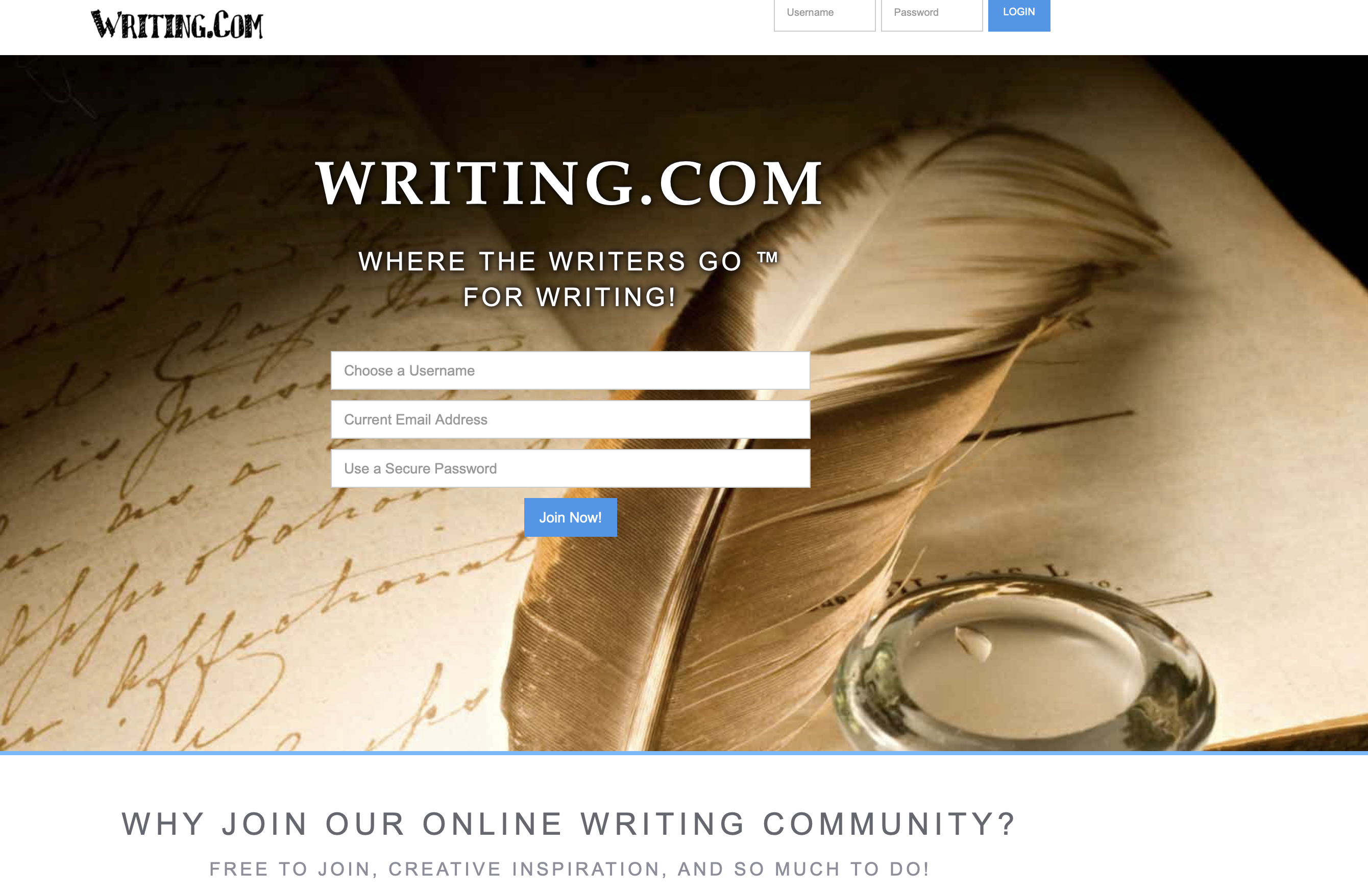
Since its start in September 2000, Writing.com has become one of the largest online writing communities, offering a welcoming social network for writers.
- Free membership: offers limited, trial-like access with basic tools and features, welcoming anyone to join and benefit from the community.
- Basic membership [$29.95 per year]: provides entry-level access with added storage space, suitable for those new to the community.
- Upgraded membership [$49.95 per year]: offers additional storage and the capability to create a variety of item types, including books, images, groups, and surveys, making it ideal for casual members and newcomers.
- Premium Membership [$139.95 per year]: delivers a feature-rich experience with all the advantages of the community, recommended by Writing.com for members seeking extensive resources and tools.
- Premium Plus Membership [$259.95 per year]: offers an enhanced version for those seeking the ultimate community experience.
5. Scribophile
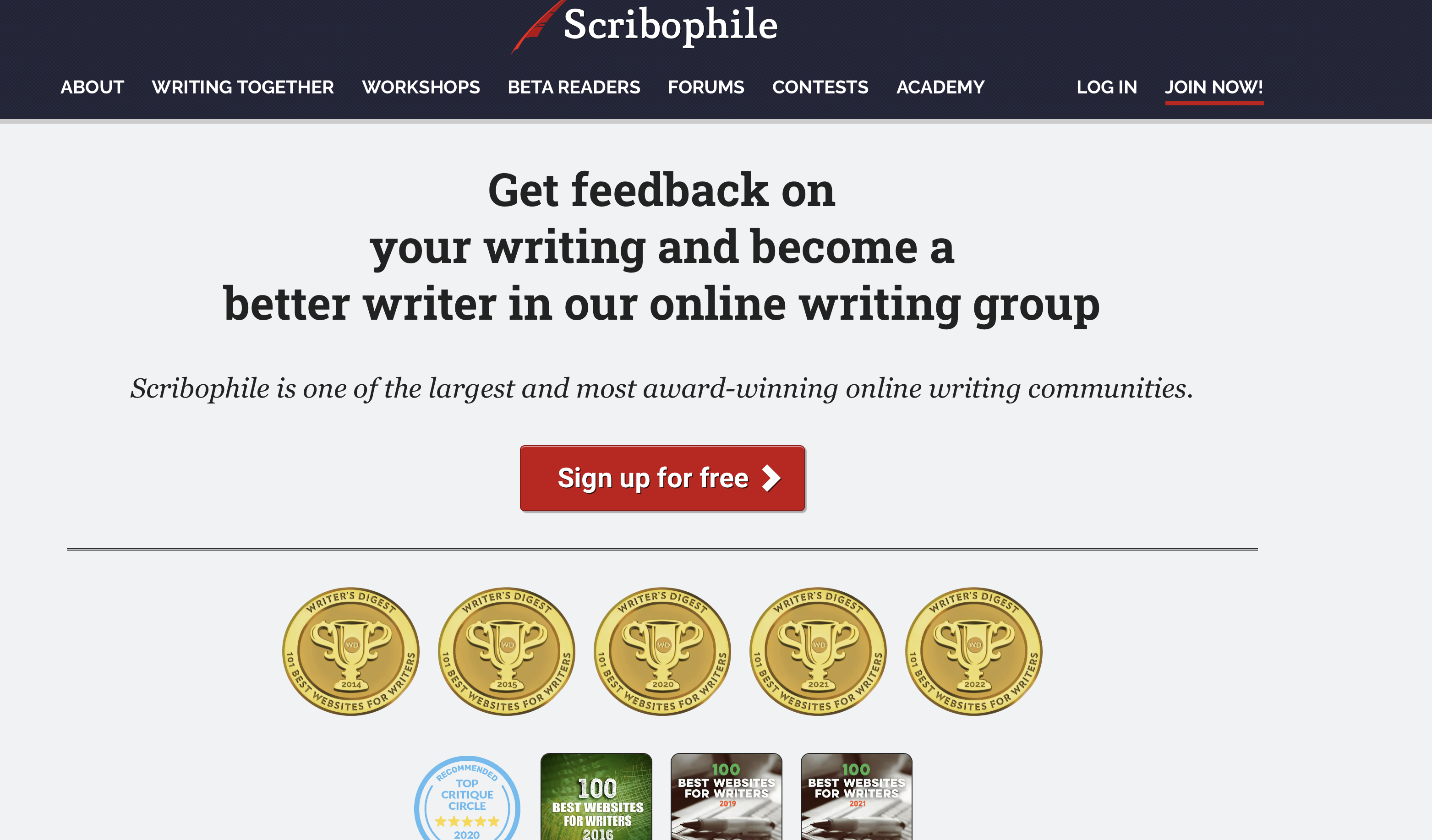
Scribophile is a writing group that provides feedback on manuscripts through a points-based peer critique system. This ensures members receive insights from various writers, enabling them to refine their work before advancing in their publishing endeavors.
Membership at Scribophile is free, with the option to upgrade to a premium subscription.
The cost of premium membership is $11/month, or an annual rate of $7.42/month. Benefits for premium members include discounts and offers from partner companies, the ability to post unlimited works simultaneously, and unlimited private messaging.
6. Critique Circle
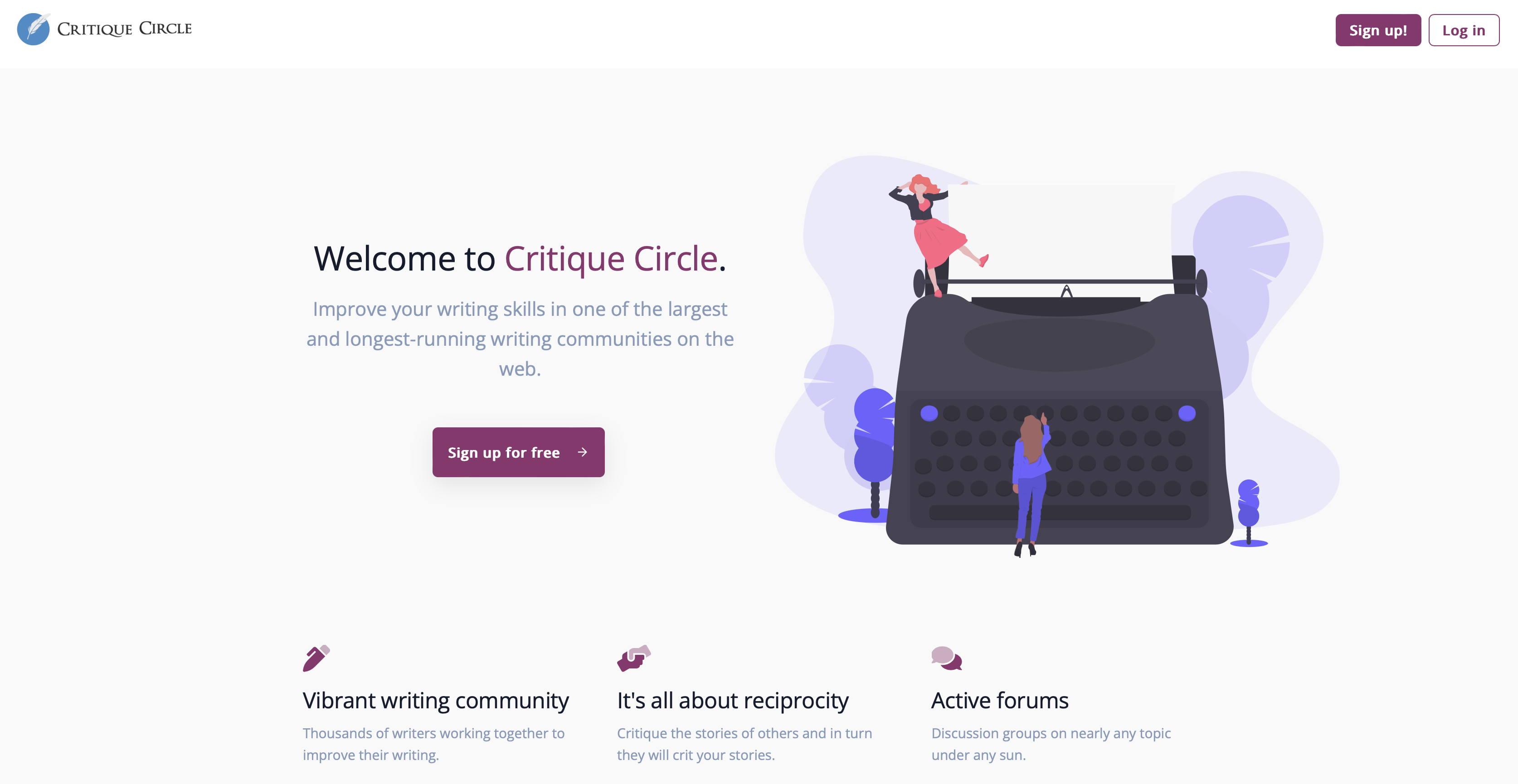
Critique Circle is an online writing group established in October 2003, making it one of the pioneering writing websites available.
This platform hosts a community where thousands of writers collaborate to enhance their craft. They offer critiques of each other's stories and benefit from reciprocal feedback. It also has various discussion groups, catering to virtually any interest.
Membership is free. For writers looking to unlock extra features, premium membership is available for $11/month, and gold premium membership for $18/month, with annual payment options reducing the cost to $5 and $8/month, respectively.
Detailed information about the supplementary benefits included in these memberships can be accessed on Critique Circle's FAQ page.
7. Writers Helping Writers
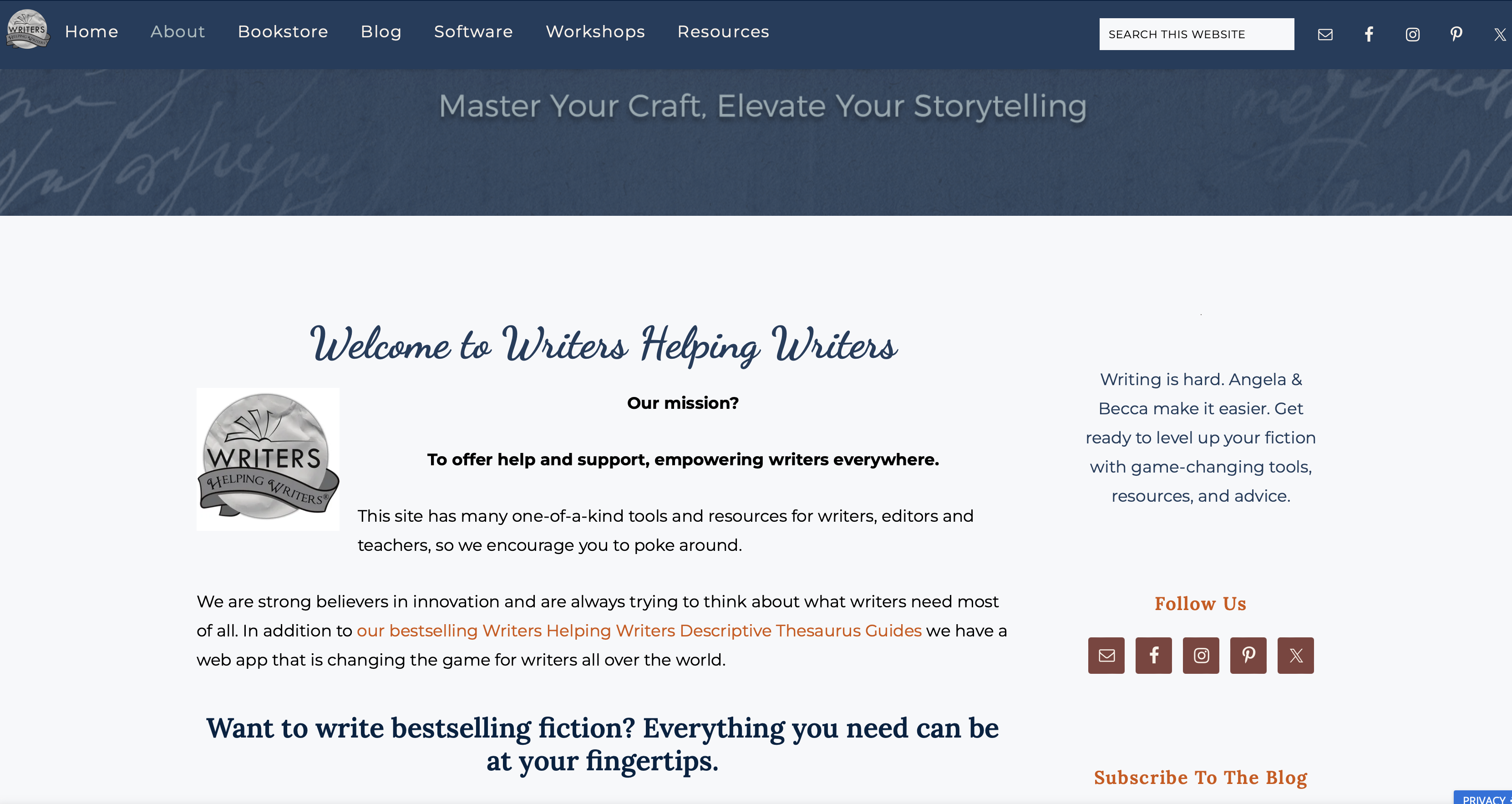
Writers Helping Writers is a writing group dedicated to mutual support and development among its members.
Launched to facilitate collaboration and growth, this writing community encourages writers to share insights, offer feedback, and encourage one another. Beyond peer support, Writers Helping Writers features resources and tools to enhance writing skills and navigate the publishing landscape.
8. Chronicles
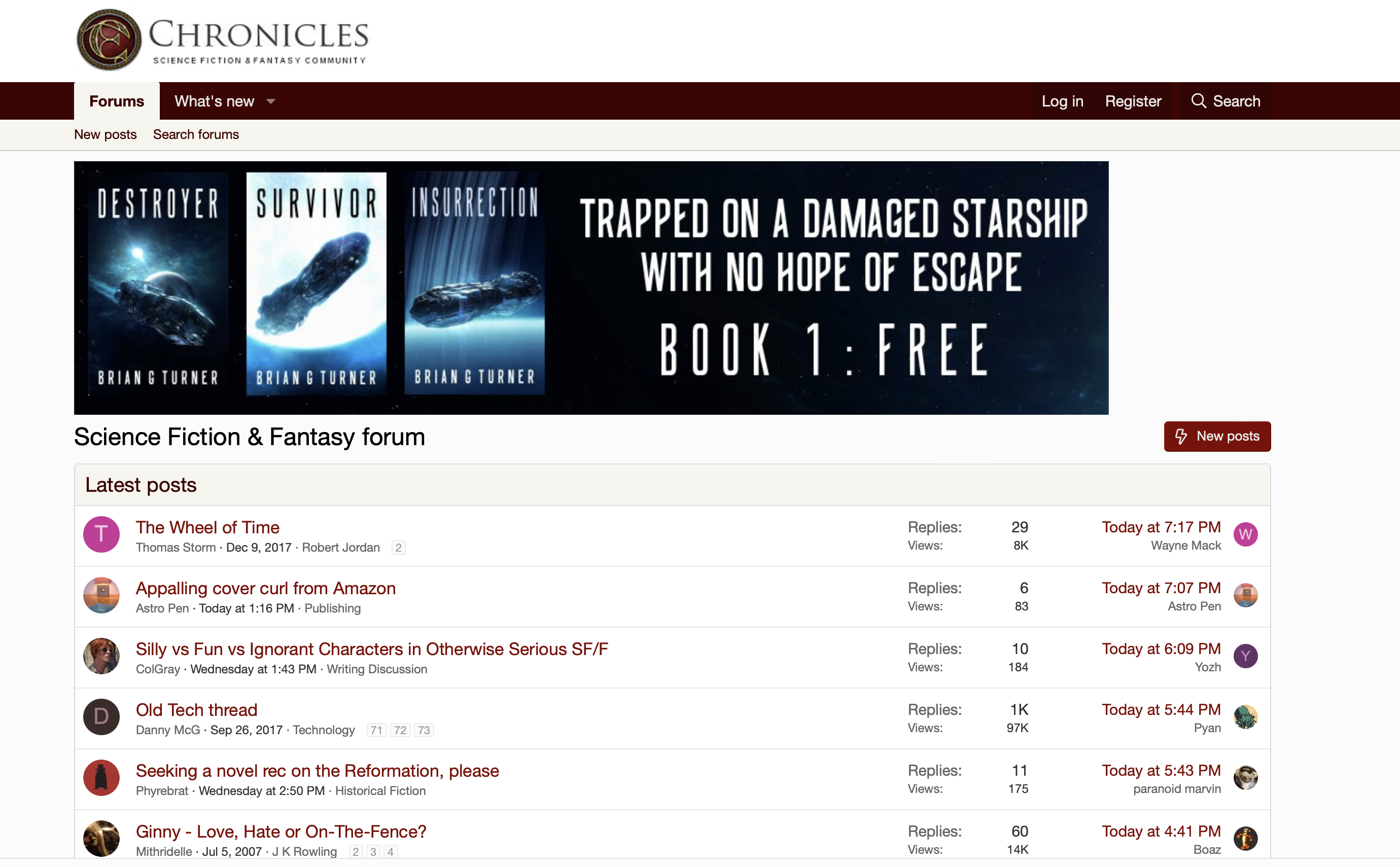
Chronicles is the largest online writing community for Science Fiction and Fantasy, providing a platform for writers to converge and discuss the latest books, news, and pop culture in these realms.
The community features numerous threads encompassing genre-specific challenges, workshops, critiques, and valuable publishing and industry insights.
9. Insecure Writers Support Group
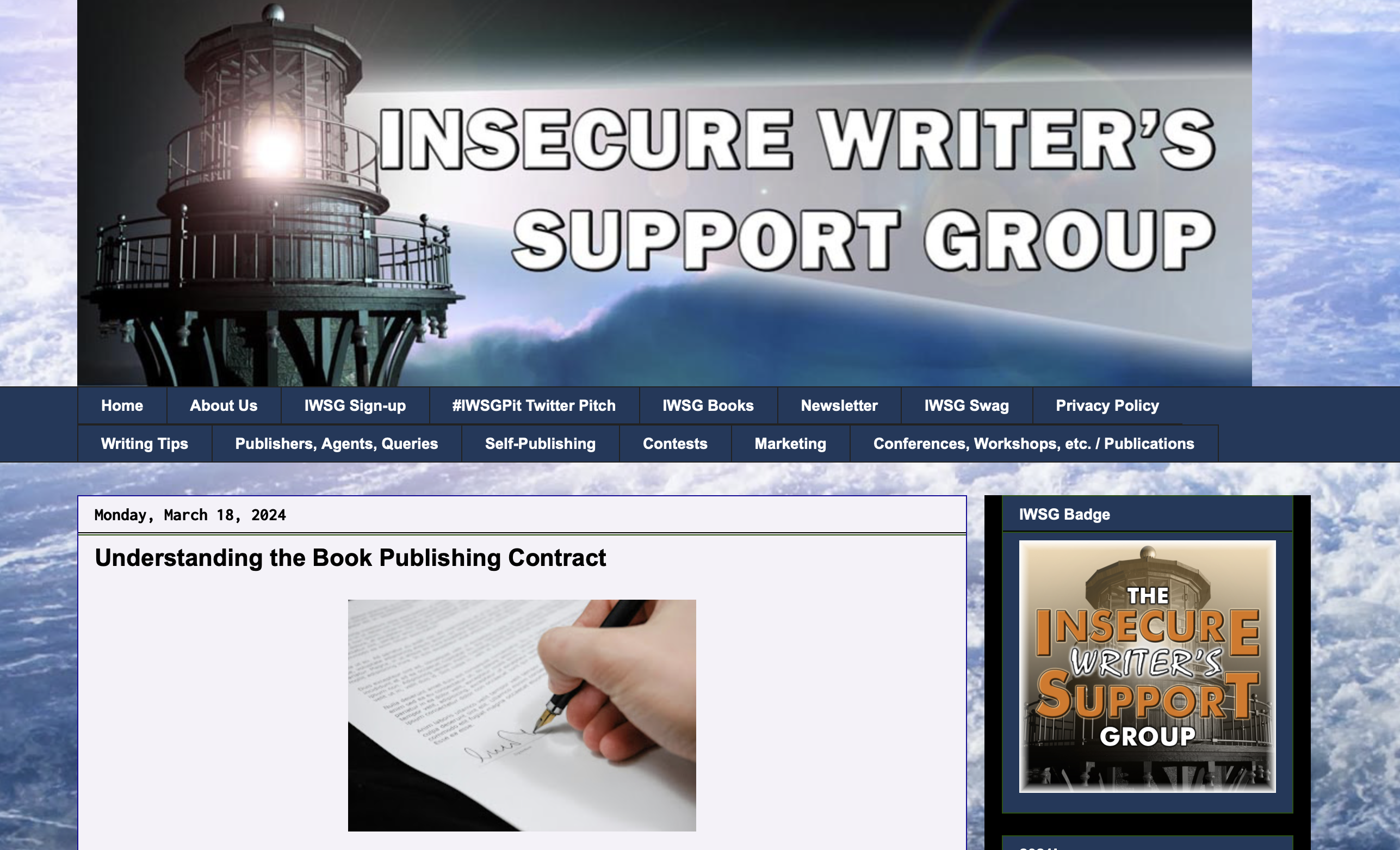
Insecure Writer's Support Group is a sanctuary for writers at all stages of their careers, from unpublished individuals to bestsellers. The primary aim is to provide support and guidance, helping writers conquer their insecurities through encouragement and fostering a supportive community environment.
10. Girls Write Now

Girls Write Now dismantles barriers related to gender, race, age, and poverty by mentoring and training the forthcoming generation of writers and leaders. The community collectively harnesses the strength of their voices and stories to influence culture, affect industries, and drive change.
Follow opportunities for young writers here.
11. Talentville
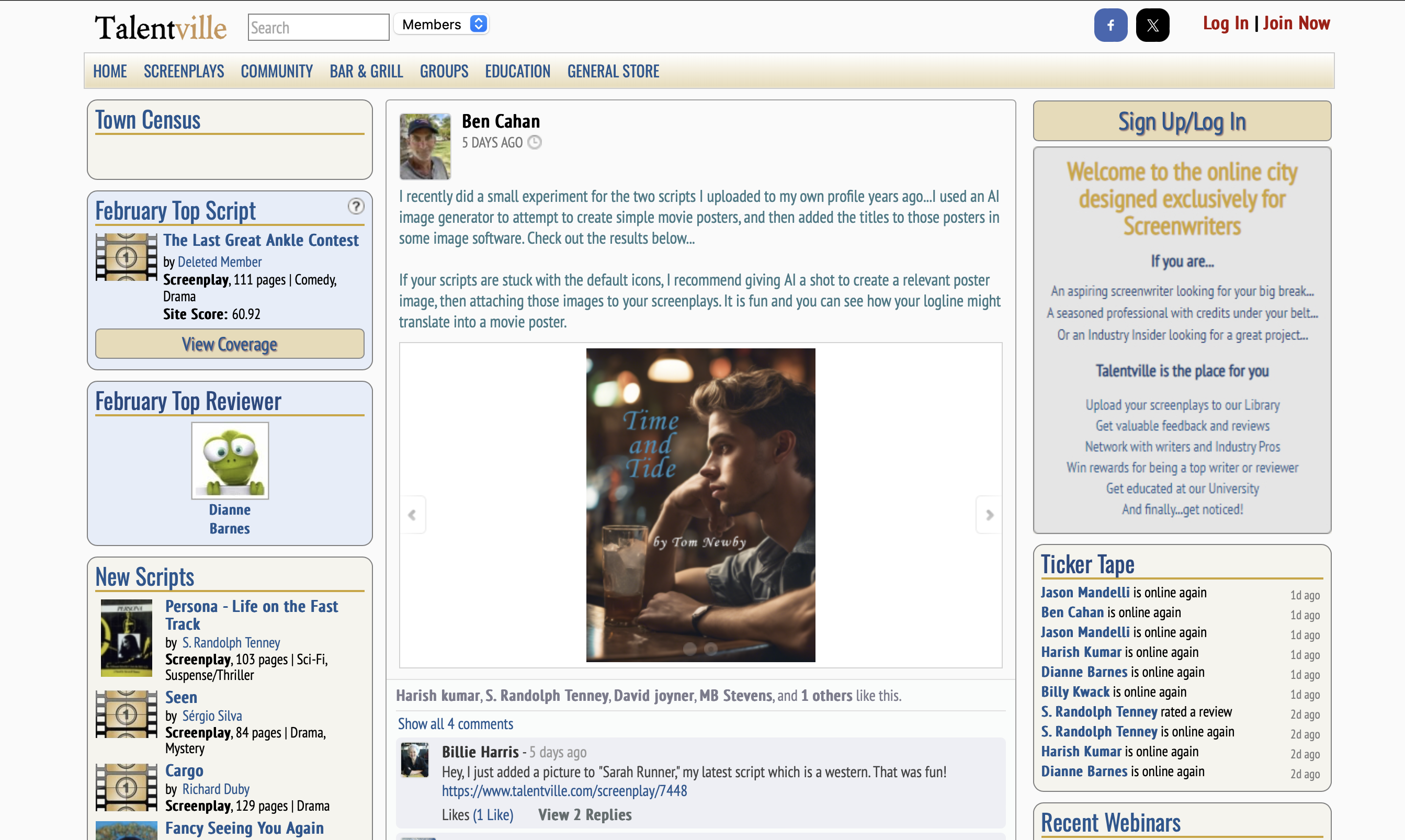
Talentville is an online writing group designed to empower screenwriters worldwide who may not have insider connections but share the aspiration of seeing their work produced.
Members can hone their craft and gain exposure, thus creating an environment that encourages individuals to improve their writing. Mutual feedback underpins the functioning of Talentville and plays a crucial role in collectively spotlighting projects and writers deserving of industry recognition.
12. Write more. Worry less. Self-publishing with PublishDrive
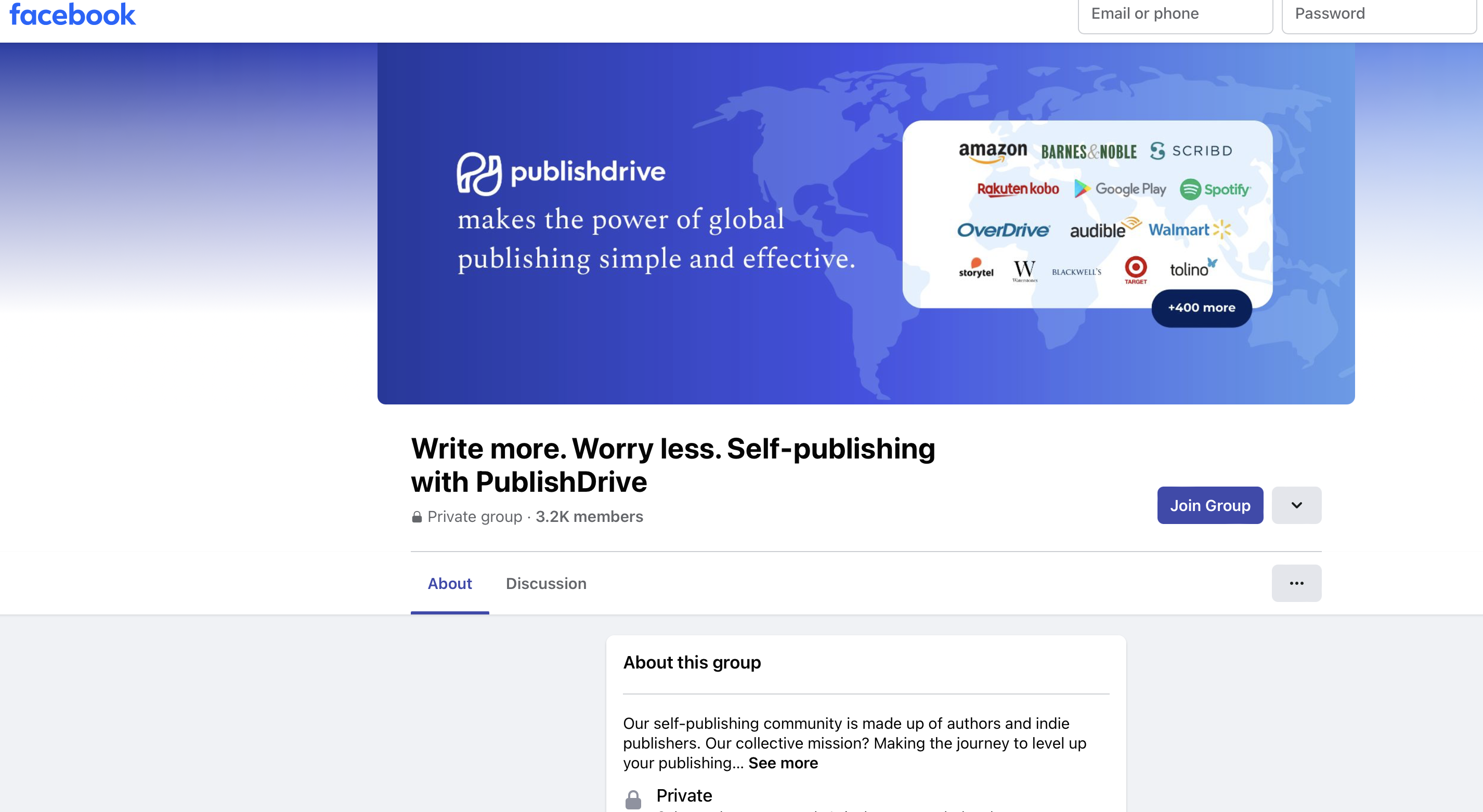
PublishDrive self-publishing community consists of authors and indie publishers united by a joint mission to simplify and enrich the journey of elevating one's publishing business.
Our writing community shares insights from bestselling authors and publishing experts alongside news, inquiries, and discussions on marketing strategies, as well as cover design ideas and various aspects of self-publishing.
Note that this space does not serve as a book promotion group, and thus, advertising books or other services is not permitted.
💡Other Facebook Writing Communities:
- The Street Team: Reedsy's dedicated book marketing group tailored for self-publishing authors.
- 10 Minute Novelists: A community for writers navigating time constraints.
- Calls for Submissions: A hub for writers in search of publication opportunities.
- Writers Unite!: A vibrant group offering robust support and motivation for both budding and seasoned writers.
Writers Anonymous: A support group for writers, no matter how public or anonymous their writing endeavors may be.
13. Goodreads Authors Groups
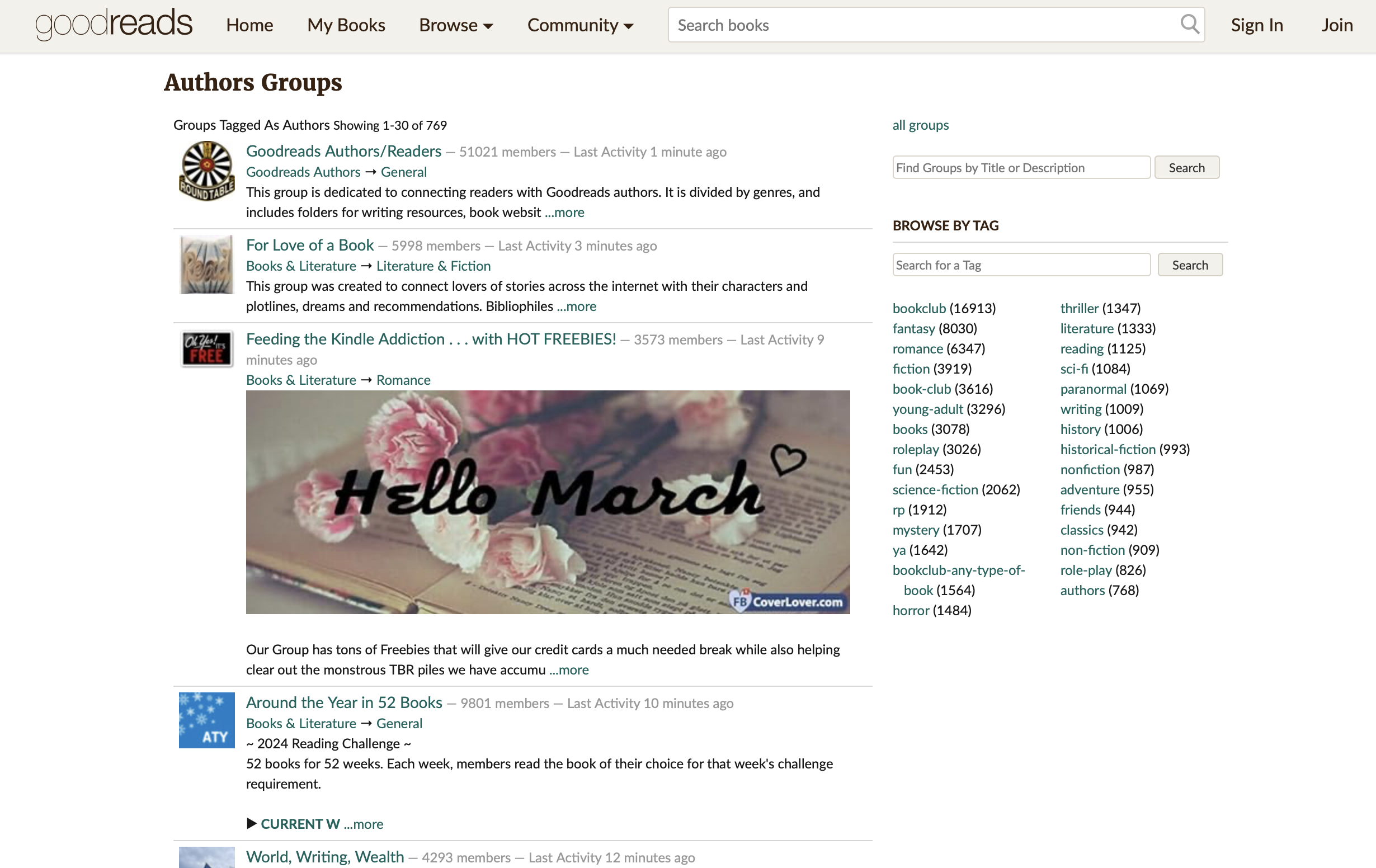
Goodreads Authors Groups is an ideal starting point for those seeking to join a group that reads the types of books they enjoy. It allows young writer to connect with numerous authors and receive advice.
14. Reddit

Reddit has numerous subreddits that attract writers across all genres, interests, and experience levels. It allows members to explore niche threads tailored to their interests, offer critiques on works, and uncover valuable resources.
💡 Among the most frequented are:
- r/writing — serves general writing needs.
- r/selfpublish — targets those exploring self-publishing avenues.
- r/writingprompts — features user-submitted writing challenges.
- r/logophilia — celebrates a love for words and wordplay.
- r/fantasywriters — caters to enthusiasts of the fantasy genre.
- r/destructivereaders — offers a rigorous critique for those prepared for blunt feedback, promising growth as a writer.
- r/writerchat — encourages discussions among writers.
- r/freelanceWriters — guides aspiring freelance writers.
- r/books — emphasizes the importance of reading for aspiring authors.
15. Underlined
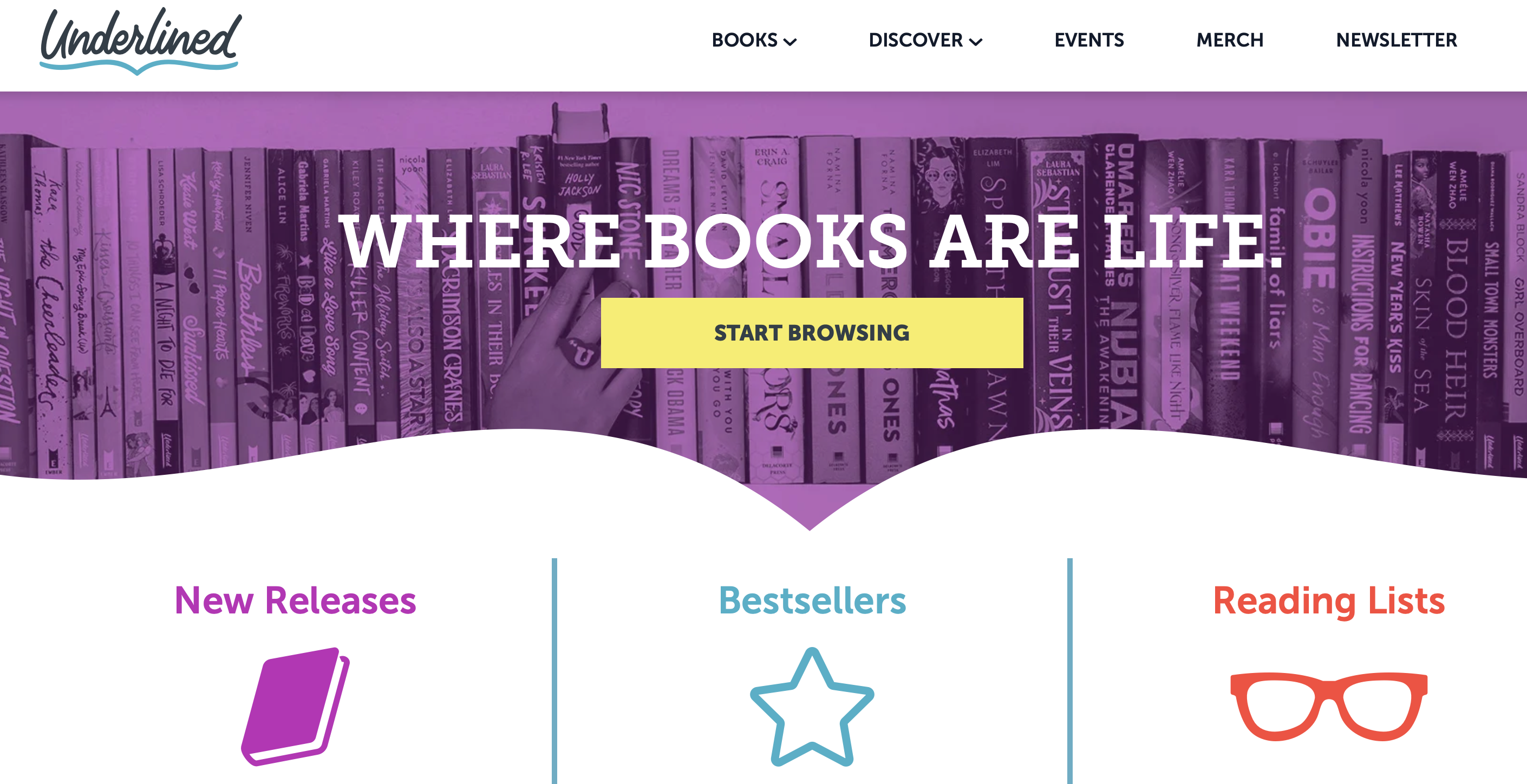
Underlined is for young writers seeking detailed information on specific genres. It offers a platform for budding authors and enthusiasts of literature by providing a mix of writing advice, updates on book releases, and Q&A sessions with authors.
16. NaNoWriMo
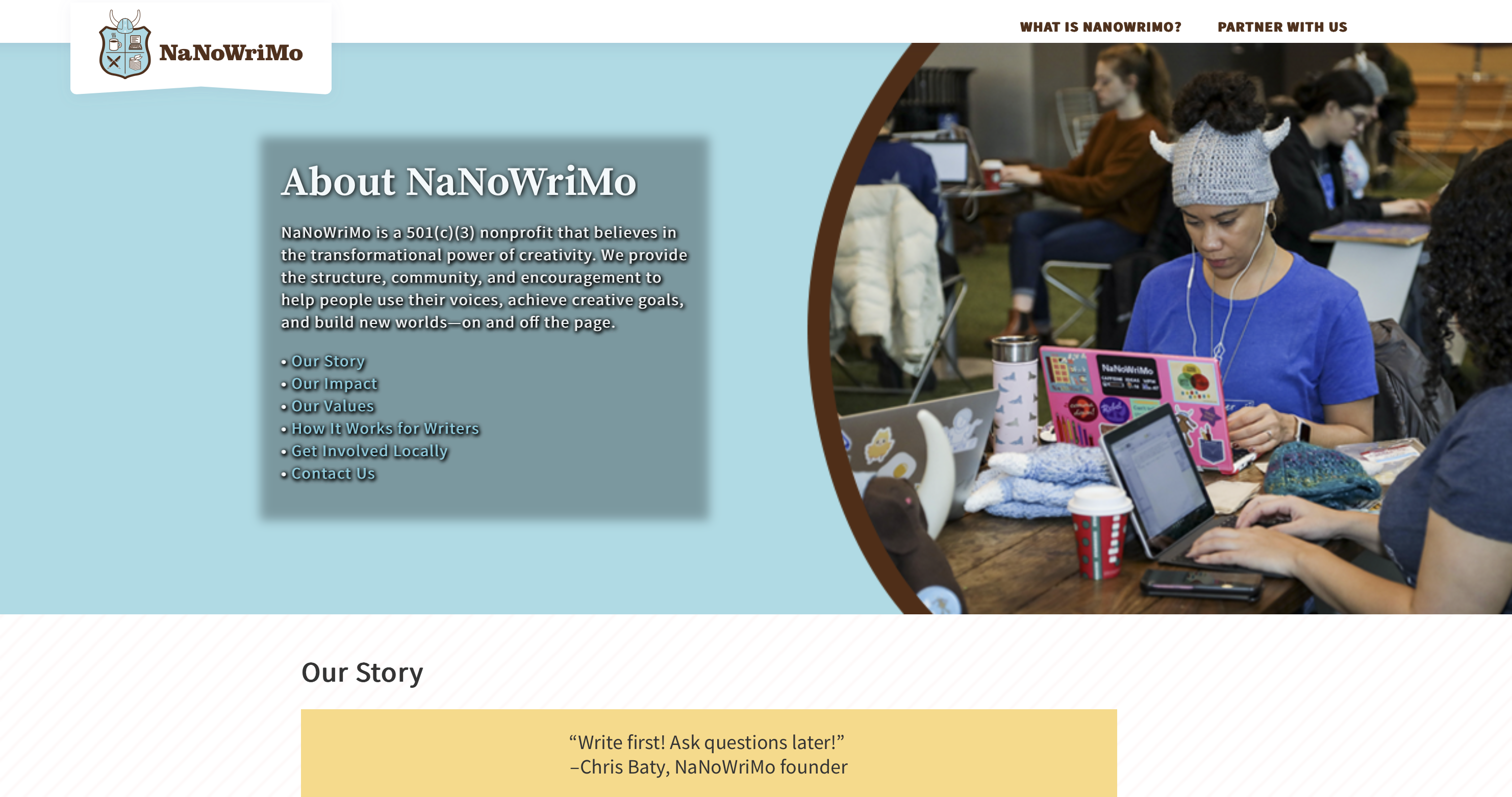
National Novel Writing Month [NaNoWriMo] is among the best online writing groups, particularly beneficial for newbie authors. It is an online writing workshop that allows writers to focus on their craft, generate drafts, set goals, and receive the necessary support and encouragement.
Their Young Writers Program fosters creativity among younger writers through easy-to-use workbooks and tracking tools. Registration on the forums requires an account, which can be created by submitting a name and email address. As with many online communities, joining NaNoWriMo comes at no cost.
Find Your Peeps!
Whether one seeks the feedback of a critique circle, the camaraderie of a writers’ group, or the vast resources of an online writing community, there is a place for every author.
Joining an author community can transform the solitary writing journey into a shared adventure. What are you waiting for?